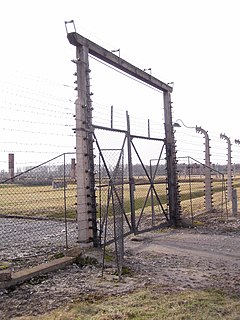 W
WAlbert Battel was a German Army lieutenant and lawyer recognized for his resistance during World War II to the Nazi plans for the 1942 liquidation of the Przemyśl Jewish ghetto. He was posthumously recognized as Righteous Among the Nations in 1981.
 W
WJohannes Albrecht Blaskowitz was a German general during World War II and recipient of the Knight's Cross of the Iron Cross with Oak Leaves and Swords.
 W
WAxel Ernst-August Clamor Franz Albrecht Erich Leo Freiherr von dem Bussche-Streithorst was a German officer during World War II who was a member of the German Resistance. He planned to assassinate Adolf Hitler in coordination with Claus von Stauffenberg in November 1943 at the Wolfsschanze.
 W
WWilhelm Franz Canaris was a German admiral and chief of the Abwehr, the German military intelligence service, from 1935 to 1944. He was initially a supporter of Adolf Hitler but by 1939 had turned against the regime.
 W
WWilhelm Cornides was a Wehrmacht sergeant in World War II, serving in the General Government territory. He was the author of the Cornides Report, which contains his account of the extermination of Jews at Belzec during the Holocaust. In December 1946 Cornides became the founder of Europa-Archiv, the first post-war magazine in Allied-occupied Germany. In 1955 he was instrumental along with Theodor Steltzer, Minister-President of Schleswig Holstein and former member of the dissident Kreisau Circle, in founding the German Council on Foreign Relations. Through his mother Cäcilie (Cilla) von Oldenbourg, Cornides was a member of the Oldenbourg family, owners of Oldenbourg Verlag publishers; a German publishing house founded in 1858 by Rudolf Oldenbourg.
 W
WGeorg Ferdinand Duckwitz was a German diplomat. During World War II he served as an attaché for Nazi Germany in occupied Denmark. He tipped off the Danes about the Germans' intended deportation of the Jewish population in 1943 and arranged for their reception in Sweden. Danish resistance groups subsequently rescued 95% of Denmark's Jewish population. Israel has designated Duckwitz as one of the Righteous Among the Nations.
 W
WKurt Gerstein was a German SS officer and head of technical disinfection services of the Hygiene-Institut der Waffen-SS. After witnessing mass murders in the Belzec and Treblinka Nazi extermination camps, Gerstein gave a detailed report to Swedish diplomat Göran von Otter, as well as to Swiss diplomats, members of the Roman Catholic Church with contacts to Pope Pius XII, and to the Dutch government-in-exile, in an effort to inform the international community about the Holocaust. In 1945, following his surrender, he wrote the Gerstein Report covering his experience of the Holocaust. He died of an alleged suicide while in French custody.
 W
WCarl Friedrich Goerdeler was a monarchist conservative German politician, executive, economist, civil servant and opponent of the Nazi regime. He opposed some of the anti-Jewish policies while he held office and was opposed to the Holocaust.
 W
WAlbert Günther Göring was a German engineer, businessman, and the younger brother of Hermann Göring. In contrast to his brother, Albert was opposed to Nazism, and he helped Jews and others who were persecuted in Nazi Germany. He was shunned in post-war Germany because of his family name, and he died without any public recognition and received very little attention for his humanitarian efforts until decades after his death.
 W
WHeinz Siegfried Heydrich was the son of Richard Bruno Heydrich and the younger brother of SS-Obergruppenführer Reinhard Heydrich. After the death of his brother, Heinz Heydrich helped Jews escape the Holocaust.
 W
WWilhelm Adalbert Hosenfeld, originally a school teacher, was a German Army officer who by the end of the Second World War had risen to the rank of Hauptmann (Captain). He helped to hide or rescue several Polish people, including Jews, in Nazi-German occupied Poland, and helped Jewish pianist and composer Władysław Szpilman to survive, hidden, in the ruins of Warsaw during the last months of 1944, an act which was portrayed in the 2002 film The Pianist. He was taken prisoner by the Red Army and died in Soviet captivity in 1952.
 W
WHans Wilhelm Münch also known as The Good Man of Auschwitz was a German Nazi Party member who worked as an SS doctor during World War II at the Auschwitz concentration camp from 1943 to 1945 in German occupied Poland. He was acquitted of war crimes at the Nuremberg Trials and is one of the few Waffen SS members today with a positive reputation.
 W
WHans Paul Oster was a general in the Wehrmacht of Nazi Germany and a leading figure of the German resistance from 1938 to 1943. As deputy head of the counter-espionage bureau in the Abwehr, Oster was in a good position to conduct resistance operations under the guise of intelligence work.
 W
WOn the night of 5 April 1944, Siegfried Lederer, a Czech Jew, escaped from the Auschwitz concentration camp wearing an SS uniform provided by SS-Rottenführer Viktor Pestek. Pestek opposed the Holocaust; he was a devout Catholic and was infatuated with Renée Neumann, a Jewish prisoner. He accompanied Lederer out of the camp, and the two men traveled together to the Protectorate of Bohemia and Moravia to obtain false documents for Neumann and her mother.
 W
WHenning Hermann Karl Robert von Tresckow was an officer in the German Army who helped organize German resistance against Adolf Hitler. He attempted to assassinate Hitler on 13 March 1943 and drafted the Valkyrie plan for a coup against the German government. He was described by the Gestapo as the "prime mover" and the "evil spirit" behind the plot of 20 July 1944 to assassinate Hitler. He committed suicide at Królowy Most on the Eastern Front upon the plot's failure.